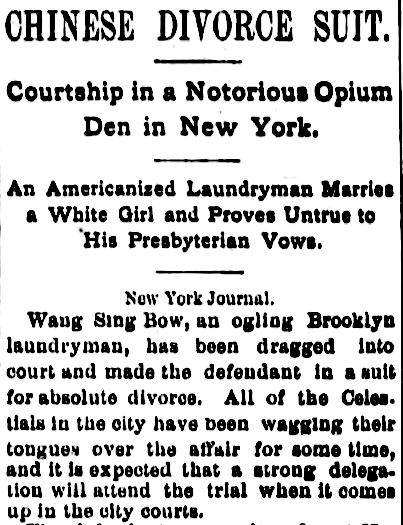 |
Years ago in a laundry shop in Paterson, when the city was a prosperous manufacturer of textiles and silk, young and pretty Minnie Kiersted stopped by weekly to drop off her employer's laundry. She caught the eye of Chinese owner Wang Sing Bow, better known as Charley Sing.
In reports of their divorce trial the papers called him "the most successful Chinaman in the City of Churches." On Sundays he dressed in a Prince Albert coat, high silk hat and patent-leather boots, and wore "a locomotive-headlight diamond."
In Minnie's testimony . . . . . . she said he had lured her and her sister (my great-great grandmother) to opium dens in Manhattan's Chinatown, all legal in their day.
 |
| "Wong Sing Bow's Child," The Times Union (Brooklyn, NY) 17 May 1889 |
They married twice--but divorced only once. Accusations of "Infidelity" lobbed back and forth. At the time of her second wedding in 1878, Minnie testified, she was pregnant with another man's child. Over the course of her divorce proceedings from 1886 to '94 she had two more children with different men, but the man she was living with and later married was not their father.
Charley Bow was caught keeping a minor in his opium den.
 |
"Chinese Divorce Suit," The Mail (
Stockton, CA) 24 Jun 1886, p. 2
Charley denied the allegations, and a month later it was found that the girl's mother, an inmate at the Pearl Street House, had given the girl to him. He wasn't prosecuted.
In "Melican Wife Fooled Wong" we learn that Minnie took his real estate,
 |
| "Melican Wife Fooled Wong," The News (Paterson, NJ) 1 Apr 1893 |
and then his furniture.
 |
| "Wong Sing Bow's Trouble," Brooklyn Daily Eagle, 23 Jun 1886 |
In the end, Charley lost the claim and custody of their son, George Sing Bow.
In 1909, a Paterson paper reported that the Commissioner of Vital Statistics in Illinois received a request for a duplicate copy of the marriage certificate.
 |
| "Kierstead Wedding," The News (Paterson, NJ) 26 Jan 1909 |
As for Minnie and her wildness, who knows who were the fathers of her children. She settled down after she won the suit. Her second husband John Popp died and she lived out her days with a daughter named Minnie, who was out of the house and married at 14, and sons John Jr. and William who lingered, along with a boarder named George H. Bowers.
On the wedding certificate for my great-grandmother Lulu, dated December 23, 1990, she names her parents as Bella Kiersted, who died in an influenza epidemic in Brooklyn a few days later on January 3rd, 1901, and her foster father Charles Lange. I doubt either were at the wedding. The maid of honor was Lulu's landlady and the best man was George H. Bowes, who has to be Minnie's son.
For young laundresses in Paterson in 1875, the excitement of dates in New York with dashing Chinese men flush with cash must have been irresistible. The flings and unplanned pregnancies that led to marriage did improve their lives. Life in Brooklyn was a step up. The sisters seemed wise beyond their years and were living well. They betrayed themselves when they divorced their husbands over infidelity--was it a surprise, really?--and made terrible second marriages, Minnie to a fishmonger and Bella to a German laundryman who scraped by, and she died young.
Minnie's children didn't escape the working class but my grandfather, Lulu's son, born and bred in Brooklyn, made it ("Walking in their footsteps," 19 Jun 2020). Living in Brooklyn he saw success firsthand. When his father deserted them, he went to work and made connections that led to plum jobs on Wall Street. But he never forgot where he came from. He lived with his mother Lulu or supported her throughout her life, and took in relatives and in-laws who were down on their luck. He told me these stories on my visits to Arizona, which he wouldn't let me write down and I've mostly forgotten, but I remember his interjections about an aunt named Maude, said in an Archie Bunker drawl,"oh Mawwd," and a guy named Samuel Kowalski who shows up in census records as Lulu's brother. "Sammy Kowalski, oh geez." But he didn't turn them away.
If Minnie and Bella hadn't jumped headfirst in love with the Chinatown businessmen who brought them to New York, my grandfather's life, and mine, could have turned out very differently. What have I learned here? I've spent way too much time at home and the library.
Contact: Debbie Carter, (212) 925-3721, VillagerExpat@aol.com
Photo credit: D.W. Griffiths' "Broken Blossoms." Opium den., (1919) Digital Collections, The New York Public Library, Astor, Lenox, and Tilden Foundations.
First news clip: "Chinese Divorce Suit," The Mail (Stockton, CA) 24 Jun 1886, p. 2.



No comments:
Post a Comment